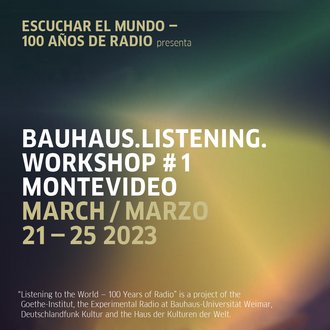First workshop in the research project »Listening to the World - 100 Years of Radio« starts in Montevideo
As part of the Artistic Research Project »Listening to the World - 100 Years of Radio«, sound artists and researchers are networking at the first Bauhaus.Listening.Workshop in Uruguay. Together they will explore the past, present and future of regional and national listening.
Radio history points to constellations of power and resistance. This also allows to trace narratives and developments in the political, social and cultural history of the region around Uruguay. Starting with the first telegraphy in Bolivia in 1897 and the first entertainment broadcasts in Buenos Aires in 1920, through the mining stations in the 1930s, as well as military radio use during the dictatorships, to today's radio art scene in Latin America with numerous community radios.
In the »Bauhaus.Listening.Workshop #1« in Montevideo, resulting questions will be explored: How has radio influenced the way we listen? What listening practices have developed over the last 100 years? And what contribution can listening make to a world of the future?
Together, the invited sound artists and researchers will explore the questions of hearing and listening in their diversity and transcultural interconnection. They will listen to archives with previously unknown material - for example, the voices of former members of the Revolutionary Armed Forces of Colombia or the Aguaruna, an indigenous people in the Peruvian jungle. And they will examine 100 years of radio in Latin America, as well as questions about the ecology of listening and the political potential of radio collectives.
Renowned sound artists and radio researchers from Colombia, Chile, Bolivia, Peru, Argentina and Uruguay - such as Fernando Godoy (Radio Tsonami), Fátima González Donado (Community Radio Amazondas), Guely Morató (Sonandes, Bolivia) and Lukas Kühne (Director Instituto de Música Facultad de Artes - UdelaR) – have been invited. The five-day Bauhaus.Listening.Workshop in Montevideo will take place during the cross-regional festival »EXIT« for experimental art.
» Here you can download the complete programme as an overview.
The workshop and research results will be collected on a new knowledge platform, the »Transcultural Listening Map«, and will in turn provide the source material for a podcast series on Deutschlandfunk Kultur and for productions by the participating countries. The Haus der Kulturen der Welt (House of World Cultures) in Berlin is planning two events in October 2023 and 2024 to mark the anniversary of »100 Years of Radio«, in which artistic and discursive positions will be presented around the project.
»Listening to the World - 100 Years of Radio« is a project of the Goethe-Institut, the Professorship »Experimental Radio« at the Faculty of Art and Design of the Bauhaus-Universität Weimar, Deutschlandfunk Kultur and the Haus der Kulturen der Welt.
It is funded by the Goethe-Institut and through the »New European Bauhaus« project of the Bauhaus-Universität Weimar. The development of the »Transcultural Listening Map« is supported by the Kreativfonds of the Bauhaus-Universität Weimar.
Bauhaus.Listening.Workshop #1 Montevideo
21 - 25 March 2023
Led by Nathalie Singer
Co-curated by Florencia Curci
Supported by Lefteris Krysalis
Goethe-Institut Uruguay
www.goethe.de/montevideo
On the occasion of the 100th anniversary of radio in Europe, the project »istening to the World – 100 Years of Radio« deals with listening as a global phenomenon. Listening to the radio has had a lasting influence on the way we live together. Radio connects peoples and creates identity – but it is also used for propaganda purposes and as an instrument of espionage and power. Radio has been a medium of globalisation from the beginning and played a key role in colonial history. In the meantime, the internet has replaced radio as a medium of global communication and has given rise to new audio formats. Our listening habits are being reshaped. Every region of the world has its own stories of listening and listening away, of communities gathering around the radio and separating again. But because radio waves do not stop at national borders, these stories are interconnected in many ways.
Nathalie Singer is Professor for Experimental Radio at Bauhaus-Universität Weimar, has worked as a radio artist and producer, composed for various media and published on sound art. She was a dramaturge in the radio play department of Deutschlandradio Kultur, where she developed new radio theatre formats (Wurfsendung). Her artistic research focuses on the development of radio art archives and their artistic mediation (travelling exhibition Radiophonic Spaces). Currently, she has launched the Bauhaus.Listening.Workshop and is particularly interested in the cultural technique of listening and its potential for the design of new environments.
Florencia Curci works as a sound and radio artist, performer, curator and cultural manager. She is the director of CASo (Centro de Arte Sonoro), an institution of the Argentine Ministry of Culture that promotes artistic research on sound, radio art, experimental music and listening studies. Curci's work has been commissioned by KunstRadio, AMEE, CA2M, Centro Cultural Kirchner and his live performances have been presented at Festival Aural, MediaLab Prado and Tsonami Sound Art Festival, among others. In 2022, he completed the Radio Art Residency at Bauhaus-Universität Weimar and also produced at WaveFarm, an American institution dedicated to radio art.
Lefteris Krysalis is a radio and sound artist and researcher. He studied art history and theory at the Athens University of Fine Arts and completed a master's degree in media art and design at the Bauhaus-Universität Weimar in the field of experimental radio and electroacoustic music studio. As a DAAD scholarship holder and visiting professor at Bauhaus-Universität Weimar, he is currently an artistic collaborator at Experimental Radio and project coordinator of the Weimar Radio Art Residence.


